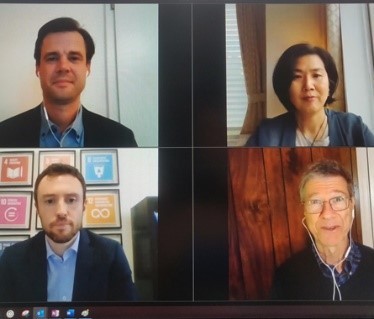World Milk Day 2024 Report – Celebrating Dairy’s Vital Role in Nutrition and Sustainability
This year, on June 1, we celebrated the vital role that dairy plays in delivering…
The COVID-19 pandemic is affecting everyone on a global scale. We all know somebody who has had to cancel plans, suddenly became unemployed or even lost someone to the virus. All countries remain highly vulnerable to new outbreaks. The economic and social consequences are unmeasurable in the short-term and unknown in the long-term. However, some have been more severely hit than others.
The pandemic has made inequality between countries, and individuals, more evident than ever before. Today, it is impossible to discuss sustainable development without considering the effects of COVID-19. It is not a surprise that this was the focus of the recently launched Sustainable Development 2020 Report.
The pandemic is a significant setback in meeting the SDGs. According to the publication, almost all goals were negatively impacted by this unexpected health crisis. The exceptions are SDG 12 (responsible consumption and production) and SDG 15 (life on land), which the authors classified the impact as “unclear”. The pandemic particularly threatens the progress made on SDGs 1, 2, 3, 8 and 10.
We could argue that we at least managed to reduce our global environmental impact. The drop in traffic is a major contributor to the fall in CO2 emissions worldwide. In China, emissions fell by 25% at the start of the year. In the UK, authorities noticed air quality improvements already during the first weeks of lockdown. But at what cost? Unfortunately, this was not a reflection of a structural change, but a global economic slowdown.
 At the launch event, Professor Jeffrey Sachs, one of the report’s authors, emphasised that we have a chance to build the society and future we want. We cannot restore economic activity by merely replicating old patterns. Any recovery strategy must have all SDGs at its core, as highlighted in the report. Moreover, one of its key messages is that collaboration is critical to address and prevent health, economic, and humanitarian crisis. In the case of a pandemic, no one is safe without robust health care systems in every country.
At the launch event, Professor Jeffrey Sachs, one of the report’s authors, emphasised that we have a chance to build the society and future we want. We cannot restore economic activity by merely replicating old patterns. Any recovery strategy must have all SDGs at its core, as highlighted in the report. Moreover, one of its key messages is that collaboration is critical to address and prevent health, economic, and humanitarian crisis. In the case of a pandemic, no one is safe without robust health care systems in every country.
2020 will be remembered as the year of the COVID-19 pandemic. But every crisis hides an opportunity. We are at a crossroad: we can choose between “business as usual” or recalibrate and accelerate change. What are you going to do?